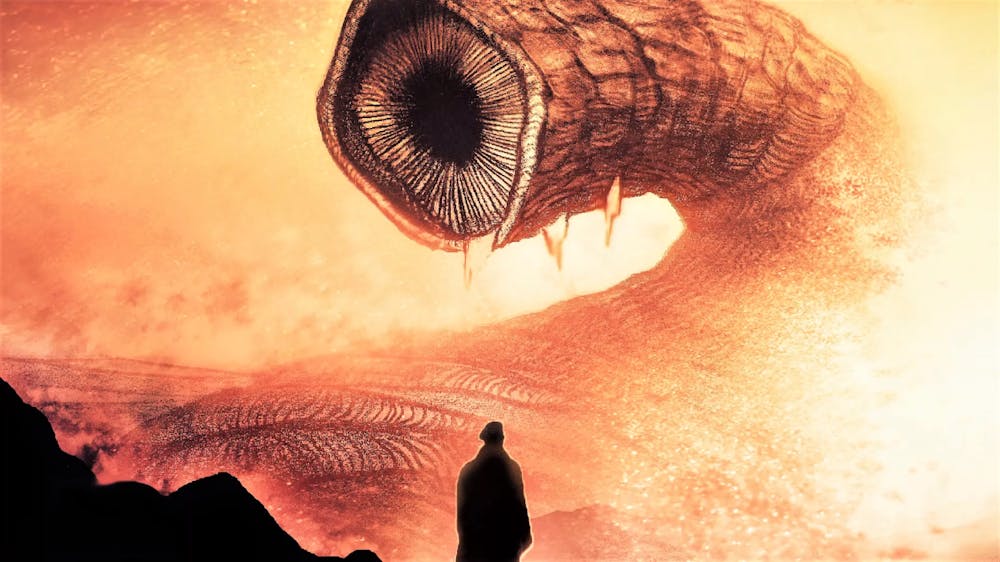The sense of anticipation and buildup for Dune: Part Two ahead of its release to theaters was intense. Based on Frank Herbert’s 1965 novel, Dune, the film debuted on March 1 with a 95% audience score on Rotten Tomatoes and an 8.9 on IMDb. Comparisons were made to acclaimed franchises like The Lord of the Rings and Star Wars. One early review I read was so overwhelmed that it simply stated, “CINEMA!!!!!!”
So, naturally, I was expecting Oscar-worthy performances. I was expecting immaculate cinematography. Lives were going to be changed by this movie. Was I concerned I was setting impossible standards that would only lead to my inevitable disappointment? Yes. Did this change my expectations in any way? No.
The film takes place shortly after the events of the first film, Dune: Part One. For those of us who don’t remember the roughly two-and-a-half-hour first film, the essential plot points are the following: One, Paul Atreides (Timothée Chalamet) has magic voice powers; two, Paul’s father is given control of Arrakis by some shady emperor; three, Arrakis is a lucrative spice planet inhabited by desert people called Fremen who want to repossess it; four, Paul’s father is killed by greedy bald guys called Harkonnen, who used to control the planet; five, the aforementioned shady emperor was the one who arranged to have Paul’s father killed; and six, Paul and his pregnant mother escape into the desert and find refuge with some Fremen.
In Dune: Part Two, Paul forms an alliance with the Fremen and agrees to help them reclaim Arrakis. As he learns the ways of the Fremen, however, he must balance his budding romance with the Fremen Chani (Zendaya) with his thirst for revenge against his father’s murderers and the growing religious fervor amongst the Fremen that deem him their Messiah, or savior.
For the most part, this film did not disappoint. It was beautiful. The landscapes of the deserts on Arrakis were stunning. The music was eerie and unsettling in the best way. And, the actors were all aesthetically flawless. Even Austin Butler, with no hair or eyebrows, exceeded my expectations. For those concerned, he looks much better than Voldemort with a nose.
The story itself was also tight and well-crafted. Every scene and line of dialogue felt intentional and necessary, a difficult feat for a movie with a runtime of almost three hours. Yes, there were slower parts, especially toward the middle of the film, as Paul broods and grapples with his uncertain future. But, even then, this lagging pace only builds tension as the film progresses to its ultimate climax.
Also, though the cast list is jam-packed with A-list actors like Florence Pugh, Rebecca Ferguson, Christopher Walken and Javier Bardem, it doesn’t feel wasteful. Even minor characters feel like they have a significant presence and the potential to become interesting. While Paul is the major protagonist, it seems like several other characters could seize the spotlight from him in the next film.
However, I did think that some of the plot development was lacking. The romance between Paul and Chani progressed very quickly, which was dissatisfying since their relationship was a major source of emotional conflict for Paul. If we’re going to have him declare things like, “I will love you as long as I breathe,” and have her deliver lines like, “You will never lose me as long as you stay who you are,” then there should be a solid foundation for their romance.
Additionally (and minor spoiler alert ahead), for most of the film, Paul maintains that he isn’t the Messiah of the Fremen. He has dreams about it. He cries about it. It’s a big deal for him so, as the audience, we buy into his resistance. Then, he drinks some bright, blue, worm Kool-Aid and passes out, and, when he wakes up, suddenly fully claims this Messiah title. Presumably, this worm juice shows him visions that alter his perspective, but we see none of this. He just wakes up a completely different character.
This feeds into how little Paul appears to struggle throughout the film. Characters are most compelling when they overcome obstacles, but everything comes naturally to Paul. I understand that the Messiah is supposed to inherently know the ways of the Fremen, but it makes his character less interesting. I want a training montage. I want to see him struggle and suffer.
I did really like Butler’s character, Feyd-Rautha Harkonnen, the major villain of the film. He’s cunning, good with knives and a potential adversary and foil character for Paul. He’s a little psychotic, but he’s also bound by a twisted sense of honor. Butler conveys these little nuances in his character very effectively. I was disappointed they resolved his story so quickly.
I also loved Ferguson’s character as Paul’s pregnant mother, though, at times, I was a little weirded out by the telepathic bond she shares with the growing fetus. To me, this removed some of the coolness of her character. In Dune: Part One, she had agency and cool powers, but, in Dune: Part Two, she just takes orders from an amorphous blob in her womb.
As I viewed this film, I was impressed by how many character arcs it attempts to fit into one movie. The actors expertly rise to the challenge of conveying the complex emotional storylines their characters demand. The world is as engaging as it is pretty, and, despite a few minor complaints, I really enjoyed it.





